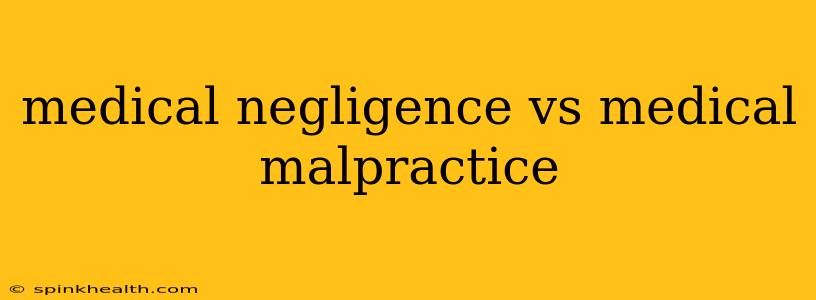The terms "medical negligence" and "medical malpractice" are often used interchangeably, leading to confusion. While closely related, they have distinct legal meanings. Imagine this: Sarah, a diligent nurse, accidentally administers the wrong dosage of medication to a patient, causing a minor adverse reaction. This is negligence. However, if Dr. Evans, a renowned surgeon, performs a procedure incorrectly, resulting in severe and permanent harm to his patient due to his failure to adhere to established medical standards, this constitutes malpractice. Let's unravel the nuances separating these crucial concepts.
What is Medical Negligence?
Medical negligence refers to a deviation from the standard of care a reasonably prudent healthcare professional would exercise in a similar situation. It's about falling short of expected actions, not necessarily involving intentional wrongdoing. Think of it as a mistake—a slip-up, an oversight, or an accident. It encompasses a broad range of actions, from administering the wrong medication (as in Sarah's case) to failing to properly document patient information or neglecting to follow up on test results. The key is that the action, or inaction, falls below the acceptable standard of care for a professional in that field. Negligence doesn't always result in significant harm, but it does represent a failure to meet the expected level of professional competence.
What is Medical Malpractice?
Medical malpractice, on the other hand, is a specific type of negligence. It's a legal claim against a healthcare professional for causing injury or harm due to a breach of the duty of care. The difference lies in the severity and consequences. Malpractice requires proving not only negligence but also that this negligence directly resulted in harm or injury to the patient. This is where the legal aspect becomes crucial. In Dr. Evans's case, his incorrect procedure and the resulting severe harm to the patient directly constitute malpractice. To successfully pursue a malpractice claim, the patient (or their representative) must demonstrate:
1. Duty of Care: A doctor-patient relationship existed, establishing a legal obligation for the doctor to provide competent care.
2. Breach of Duty: The doctor violated the accepted standards of medical care, falling below the expected level of competence for a healthcare professional in a similar situation.
3. Causation: The doctor's negligence directly caused the patient's injury or harm.
4. Damages: The patient suffered measurable harm, such as physical injury, emotional distress, or financial losses, as a direct result of the doctor's negligence.
What is the difference between medical negligence and medical malpractice?
The key difference boils down to consequence and legal action. Medical negligence is a failure to meet the standard of care, while medical malpractice is negligence that results in harm and forms the basis of a legal claim. Negligence might be a minor oversight with minimal consequences, while malpractice involves significant harm caused by a professional's substandard actions or inactions.
How are Medical Negligence and Malpractice Proved?
Proving either negligence or malpractice usually requires expert testimony from other medical professionals who can attest to the standards of care in the relevant field and whether those standards were met. Medical records, witness testimonies, and other evidence play crucial roles in building the case.
What are the potential consequences of medical negligence and malpractice?
The consequences of medical negligence can range from minor patient discomfort to significant complications. Malpractice, however, carries far more serious repercussions, potentially leading to lawsuits, significant financial penalties for healthcare providers, loss of license, and reputational damage.
This detailed explanation distinguishes medical negligence from medical malpractice, emphasizing their differences and the legal implications of each. Understanding these distinctions is crucial for both healthcare professionals and patients alike.

